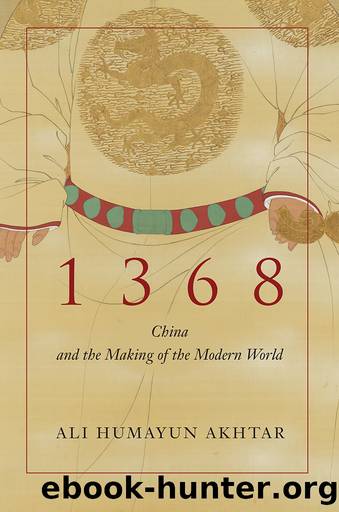1368 by Ali Humayun Akhtar

Author:Ali Humayun Akhtar
Language: eng
Format: epub
Publisher: Stanford University Press
Published: 2022-08-15T00:00:00+00:00
The answer can partly be found in how Enlightenment-era thinkers extracted ethical principles from ancient figures of wisdom without necessarily adopting all of the spiritual practices and doctrinal beliefs associated with their followers. For Thomas Paine, this meant believing in representations of Jesus in the broad sense of his ethics and virtues without accepting the entirety of Christian doctrine. Of Jesus, Paine wrote: âHe was a virtuous and an amiable man. The morality that he preached and practiced was of the most benevolent kind; and though similar systems of morality had been preached by Confucius, and by some of the Greek philosophers, many years before, by the Quakers since, and by many good men in all ages, it has not been exceeded by any.â35 In this context, Paine represents Confucius and Jesus as wise philosophers in a sense. There were parallels in the case of Voltaire (d. 1778).
In Voltaireâs work, one finds representations of both Chinaâs imperial history and the story of Confucius. In the former case, Voltaire wrote a play in 1755 on the Chinese clash with the Mongols, which represented Genghis Khan as the villain. The play, called The Orphan of China (LâOrphelin de la Chine), was based on a Chinese play titled The Great Revenge of the Orphan of Zhao by Ji Junxiang (d. ca. 1279). Voltaire was introduced to it by the Jesuits, and by 1755, his version was being performed by Parisâs premiere acting troupe: La Comédie Française. The Parisian acting troupe was established in 1680 by royal decree and was the product of a merger between Parisâs only two acting troupes: Guénégaud Théatre and Hôtel de Bourgogne. Throughout the eighteenth century, attendance at the Comédie Française shows was an important pastime of the French nobility. The French, thus, became one of the first and most prominent groups of Europeans after the Dutch who were on the receiving end of Jesuit-transmitted representations of Chinese political and intellectual history. Beyond rearticulating these originally Jesuit-formulated images through his playwriting work, Voltaire wrote other works that curated these images of China according to a metanarrative about Confucianismâs merits and Chinaâs overall cultural advancement.
The currency of Chinese intellectual culture once identified by the Jesuits in the sixteenth century, in other words, was being identified by influential European philosophers and playwrights in the eighteenth century. In Voltaireâs grand narrative of world history, titled An Essay on Universal History: The Manners and Spirit of Nations (Essai sur les moeurs et lâesprit des nations), Voltaire represents China as historically advanced in its ethical philosophies, especially Confucianism. Confucius âunveiled the light of reason to mankind,â he claimed, and the example of a government run by Confucian literati represented the unachieved possibilities in Europe where philosophers ought likewise to serve as political administrators.36 In the context of his interest in the possibilities and limits of rational thinking, Voltaire was impressed by how Chinese history makes âno mention of a college of priests,â explaining that their ethical philosophies âbrought morality to perfection.â37
One of the most
Download
This site does not store any files on its server. We only index and link to content provided by other sites. Please contact the content providers to delete copyright contents if any and email us, we'll remove relevant links or contents immediately.
Spare by Prince Harry The Duke of Sussex(5196)
Navigation and Map Reading by K Andrew(5156)
Tuesdays with Morrie by Mitch Albom(4784)
Machine Learning at Scale with H2O by Gregory Keys | David Whiting(4313)
Cracking the GRE Premium Edition with 6 Practice Tests, 2015 (Graduate School Test Preparation) by Princeton Review(4293)
Never by Ken Follett(3956)
Goodbye Paradise(3810)
What It Really Takes to Get Into Ivy League and Other Highly Selective Colleges by Hughes Chuck(3760)
Fairy Tale by Stephen King(3396)
Harry Potter and the Prisoner of Azkaban (Book 3) by J. K. Rowling(3359)
Pledged by Alexandra Robbins(3178)
Kick Ass in College: Highest Rated "How to Study in College" Book | 77 Ninja Study Skills Tips and Career Strategies | Motivational for College Students: A Guerrilla Guide to College Success by Fox Gunnar(3129)
Reminders of Him: A Novel by Colleen Hoover(3116)
A Dictionary of Sociology by Unknown(3085)
Sapiens and Homo Deus by Yuval Noah Harari(3071)
The Social Psychology of Inequality by Unknown(3031)
Graduate Admissions Essays, Fourth Edition: Write Your Way into the Graduate School of Your Choice (Graduate Admissions Essays: Write Your Way Into the) by Asher Donald(2921)
Will by Will Smith(2919)
Zero to Make by David Lang(2783)
